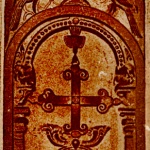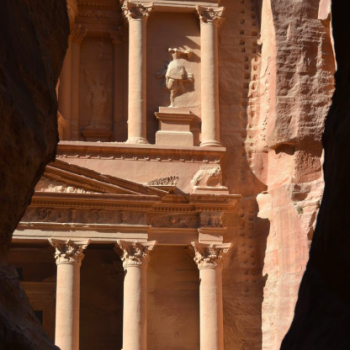No Rest for the Wicked
I hope other people find the fact that I fell behind on posts again immediately after I caught up funny, because I do. (My official job hit me like a ton of bricks last week.)
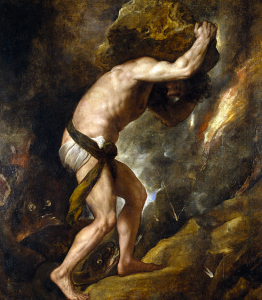
Sisyphus, Titian, 1549.
Anyway, in hopes of catching up a second time, I’m going to do the Gospel passages from the last two weeks more minimally, without the long intros I’ve made a habit of for a while here. Hopefully that means I can get them out a smidge faster! And neither one is from Mark, so there’s less of a thematic loss that way. Anyway.
Luke 24.35-48, RSV-CE
Then they told what had happeneda on the road, and how he was known to them in the breaking of the bread.
As they were saying this, Jesus himself stood among them, and said to them, “Peace to you.” But they were startled and frightened, and supposed that they saw a spirit. And he said to them, “Why are you troubled, and why do questionings rise in your hearts?b See my hands and my feet, that it is I myself; handle me, and see;c for a spirit has not flesh and bones as you see that I have.” And when he had said this, he showed them his hands and his feet.d And while they still disbelieved for joy, and wondered, he said to them, “Have you anything here to eat?” They gave him a piece of broiled fish, and he took it and ate before them.

Then he said to them, “These are my words which I spoke to you, while I was still with you, that everything written about me in the law of Moses and the prophets and the psalmse must be fulfilled.” Then he opened their mindsf to understand the scriptures, and said to them, “Thus it is written, that the Christ should suffer and on the third day rise from the dead, and that repentancef and forgiveness of sins should be preached in his name to all nations, beginning from Jerusalem. You are witnesses of these things.”
Luke 24.35-48, my translation
And they laid out the things that happeneda on the way and how he became known to them in the breaking of the bread.
As they were talking about these things, he stood in the midst of them. They were startled and afraid—they thought they were observing a spirit; but he said to them: “What has you troubled, and why do disputes cloud your mind?b Look at my hands and my feet, that it is I myself; feel your way over me and look,c for a spirit does not have flesh and bones, as you observe I have.” Saying this, he also showed them his hands and feet.d And while they were yet unbelieving out of joy, and astonished, he said to them: “Do you have anything to eat in this place?” So they gave him a piece of cooked fish; and taking it, he ate in front of them.
Then he said to them: “These are the words that I said to you, being as yet with you, that all must be fulfilled that is written in the law of Moses and the prophets and the psalmse about me.” Then he opened their heartsf to understand the Writ, and said to them that “Just so it is written, that the anointed must suffer, and rise from the dead on the third day, and in his name, change of heartf and remission of sins is to be proclaimed to all nations—beginning from Jerusalem; you are witnesses of these things.”
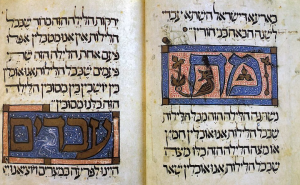
A 14th-cent. Haggadah (Passover liturgy) from
Sarajevo, open to the “Four Questions” (Why is
this night different from all other nights?, etc.);
before 70 CE, five questions were asked, and in
Luke 24, Jesus asks the Apostles five questions.
Textual Notes
a. what had happened/the things that happened: I mention this only as a shop-window display of thoroughness and exactitude: the word “happened” has no equivalent from which it is translated in the Greek. This is because auxiliaries, or “helping verbs,” are not used in all languages (and not equally important in all languages that do use them). Verbs of being, becoming, or happening are often superfluous in Greek; it’s understood, when the text says literally that “they laid out the things on the road,” even though they just came back from the road, that they laid out the things which happened on the road. (English invites us to assume missing information all the time—just tends to do it in different patterns than Greek.)
b. why do questionings rise in your hearts?/why do disputes cloud your mind?: This was kind of a toughie to render without making it hopelessly clunky (and see also note f for discussion of one of my choices here). The “questionings” or “disputes” are my translation of a noun derived from the verb dialogizomai [διαλογίζομαι], often used about doubts and quarrels in the New Testament; Mark 2.6 tells us that the local Pharisees dialogizomai‘d silently over Jesus’ claim to forgive the sins of the paralytic. Etymologically, the verb simply means “to reason through, talk through, consider”; idiomatically, it can mean “to settle accounts,” or alternatively, “to discuss, argue, dispute; to hold court [about].”
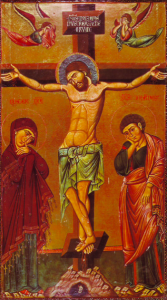
13th-cent. ikon of the Crucifixion showing
the Five Wounds, from St. Catherine’s
Monastery on Mount Sinai.
c. handle me, and see/feel your way over me and look: This always makes me think of the opening of I John: “which we have seen with our eyes, which we have looked upon, and our hands have handled, of the Word of life”. My attention was caught by the verb used here, which I don’t think I had seen before. It is psēlaphaō [ψηλαφάω], a word compounded from psallō [ψάλλω] “to pluck, pull” (as one does of the strings of a harp—hence the word psalm), and aphaō [ἀφάω] “to handle, touch, feel”; psēlaphaō might be used to describe the actions of a blind man groping his way somewhere. Here, it’s just about saying “tug on me and see for yourself.”
d. when he had said this, he showed them his hans and his feet/Saying this, he also showed them his hands and feet: It’s difficult to be sure, and I don’t know that the text really establishes one reading over the other. However, it seems to me that the Greek here would equally sustain both the interpretation that the RSV went with, and the interpretation that he showed them his hands and feet at the same time that he spoke these words. I accordingly aimed for a rendering that could be read either way.
e. the law of Moses and the prophets and the psalms: This appears to reproduce the divisions of the Hebrew Bible, which is differently organized from the Old Testament as used by Christians. The Christian version follows an arrangement inherited from the Septuagint (and, in the case of several books, texts inherited from the Septuagint as well, except in most Protestant traditions). The divisions of the Hebrew Bible are:
- the Torah (Towrah) [תּוֹרָה], meaning “Law” or “Teaching”;
- the Nevi’im (Neviy’iym) [נְבִיאִים], meaning “Spokesmen” or “Prophets”; and
- the Ketuvim (K’thuviym) [כְּתוּבִים], meaning “Writings.”
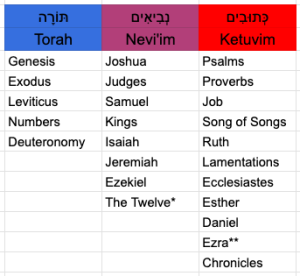
The books of the Hebrew Bible, in their
most usual order.
Differences in how the books are numbered results in a total of twenty-four books, as opposed to the thirty-nine found in the Protestant Old Testament (rising to more than forty in the longer canons used by the Catholic, Orthodox, and Miaphysite Churches).† The fact that the Ketuvim begin with the book of Psalms, and that much of the rest of this division also consists in poetry (the next three books plus Lamentations and Ecclesiastes), may have made it natural to use “the Psalms” as shorthand for the Ketuvim generally.
f: minds … repentance/hearts … change of heart: The terms most commonly translated “mind” and “heart” are nous [νοῦς] and kardia [καρδία], respectively, while the standard word for “repentance” is metanoia [μετάνοια], which is related to nous and can be literally translated “afterthought.” Now, it would be misleading to say that the Greeks merely swapped our notions of what belonged to the sphere of the mind and what belonged to the sphere of the heart. However, it is true that an idiom like “pondered it in her heart” would be well-served by a translation like “turned it over in her mind,” and that the “afterthought” to which Christ invited his listeners is in many ways closer to what we would call a “change of heart.” For this passage at least, then, I have effectively swapped the traditional translations of the words. (Maybe some day I’ll figure out a satisfying way to render at least one of the pair.)
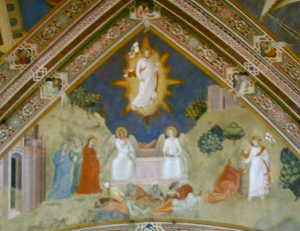
A fresco of the Resurrection by Andrea da
Firenze from New St. Mary’s, created in
1366. Photo by Wikimedia user Sailko, used
under a CC BY-SA 2.5 license (source).
*The Twelve indicates the twelve “minor prophets”: Hosea, Joel, Amos, Obadiah, Jonah, Micah, Nahum, Habakkuk, Zephaniah, Haggai, Zechariah, and Malachi. In the Hebrew Bible, they are treated as a single book. (Note also that the books of Samuel, Kings, and Chronicles are not split in two, as they normally are in Christian Bibles.)
**In Judaic usage, Ezra consists in both Ezra and Nehemiah (because what the title “Ezra” means wasn’t confusing enough already).
†It is possible that the “twenty-four elders” of Revelation are meant to be a nod to the twenty-four books of the Hebrew Bible, though more probably it symbolizes the combined numbers of the twelve patriarchs and the twelve apostles, thus signifying the full number of the elect. It is also possible (and in my opinion rather more likely) that the arrangement of the New Testament—the Gospels and Acts, the Epistles, and lastly the Apocalypse—was meant to parallel the structure of the Hebrew Bible.


